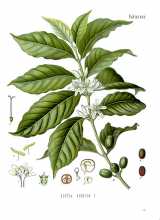If we're to believe the Dunkin' Donuts marketing slogan, all of America is already powered by coffee. If only that were as true as it felt. While many of us may get most of our morning boost from the good old grounds, America itself still runs on nasty, earth-destroying sludge. Those trucks that transport your beans to your local grocery store burn up gas on a daily basis, and chances are the electricity that powers your coffee maker isn't even sourced from an environmentally friendly place. Most of our power is not so green. But what if we could get actual--not just metaphorical--energy from the same coffee we drink each morning?
A new kind of technology might just make that possible. Green Mountain Roaster, one of the biggest suppliers of the bean, has adopted a process originally developed by NASA to power lunar bases. It's apparently possible to break down plant matter into something called "syngas": a type of fuel molecularly similar to natural gas which can also be burned to reap electricity and heat. The fuel is even efficient enough to power vehicles.
All you need to do to create syngas is heat your materials to just under 600 degrees fahrenheit in a vacuum. That will give you a dry powder that's chock full of energy. Both the residual grounds and the paper filters from brewing coffee could theoretically be transformed into syngas. The only problem is that creating the stuff carries some major risks. The powder could explode spontaneously while lying around in storage, which is bad news for a lot of reasons. Until we develop a way to safely contain and transport the stuff, it's not likely that it'll catch on as the next great source of energy.
But if we did find a way to make these natural gases safer, we could extract clean-burning energy from all sorts of waste, not just the kind you get from mass coffee brewing. All the paper and plant matter that would otherwise go to the dumpster could be used to power our vehicles and homes. Of course, we probably wouldn't need much more bio-waste than the stuff Starbucks throws out on a daily basis. Coffeeshops of the world could first power our citizens and then power their workplaces. America could actually run on Dunkin like they claim. Let's hope they add a little truth to that advertising and keep developing biomass technologies.
